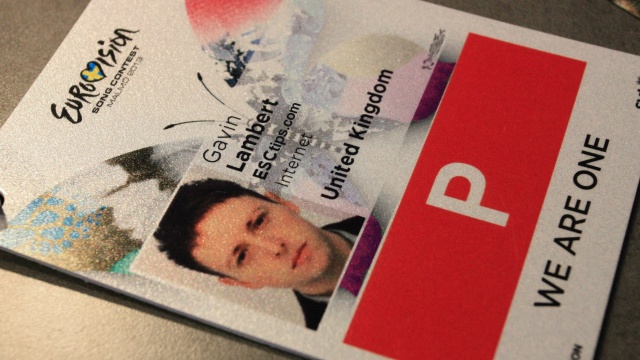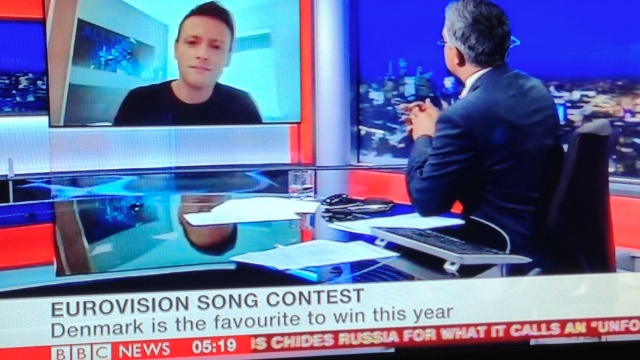Betting on the Eurovision Song Contest comes in many forms, ranging from the odd £10 from casual punters, to those who stake thousands on the gamut of markets available since the online betting boom. Over the last 10 years I have transitioned from betting for fun, to someone that earns an annual wage from the Song Contest. What’s it like to move from plucky punter to professional gambler, how does it all work, and some advice on how to spot the winning song.
How It All Started
Working in a bar sometime in 2006, I remember receiving a tip that ‘a rock group were a dead cert to win Eurovision.’ I opened my first betting account and remember staking around £40 at double-figure odds. Finnish hard rock group Lordi, then went on to win in Athens and from that moment I was addicted to the Eurovision betting vice.
The following year, I did what most casual punters do: I listened to all of the songs on the day of the final and backed the two I thought would do best, which turned out to be ‘Molitva‘ and ‘Dancing Lasha Tumbai’, though I much preferred the latter and it remains my favourite Eurovision entry nearly a decade later.
It wasn’t until 2010 that I started studying the Song Contest in greater detail, though I was still relatively naïve and it took a while before I understood the mechanics behind the results and terms such as diaspora, regional voting patterns, and jury influence. It’s at this point I joined a little known betting forum that enjoyed indulging in the guilty pleasure of Eurovision.
Amongst other gamblers I learned not only how to win, but importantly how to lose. I fondly remember backing Italy to win in 2011 at odds of over 100/1 each way, but I also recall my novice bets like De Toppers to qualify and Feminnem to win – the less said about Horehronie the better!
Every gambler will have dodgy bets in their portfolio. It’s impossible to get things totally correct, and as one of a few bold enough to air their views in public, people often return after the event to thrust your bad bets and wrong calls in your face. Even so, the only reason we turn a profit is because we get more things right than we get wrong – that is the name of the game!
Going Public On The Web
In 2011 ESCtips was born, and since then every January to May has been a dizzying blur. Writing over 40 song reviews, producing podcasts and continually monitoring the betting markets takes its toll, but it actually helps crystallise my thoughts. For me it’s a job that gives me a healthy second income, so when friends ask why I can’t go out on a Saturday night in January or February, it’s because I’m at work, albeit watching Melodifestivalen or the myriad of other national finals.
With a website to run and a growing win target, 2011 was the first year I booked two weeks off from my regular job to monitor rehearsals. Like many gamblers without a press pass, I was huddled over my laptop obsessively refreshing YouTube while switching between the old ‘All Kinds Of Everything‘ blog and watching the escXtra livestream. Those shaky, out-of-focus fan videos were all I had to go on, and even now, I’m amazed how much faith I invested in them given they showed just a tiny impression of the overall package.
In 2013 I successfully applied for a press pass and another steep learning curve ensued.

This badge was worth a lot of money (Image: Gavin Lambert/Facebook)
Accredited
Watching rehearsals from the press centre for the first time was both exhilarating and rather overwhelming. Seeing a TV feed was something I’d dreamed of in previous years, but in a packed press centre full of cheering fans, it was easy to fall victim to hyperbole or write off countries after a single performance. For instance, Cascada’s first rehearsal in Malmö saw Germany’s odds tumble, and rather than opposing the move as I would now, I went with it and gave away valuable margin to a song that finished 21st.
With three press centre experiences under my belt, I am now more conscious of the fan reaction and what motivates market movements, meaning I can take a more measured approach.
Being trapped in the fan bubble for two weeks means I miss Graham Norton’s ill-informed coverage on the BBC. Last year, Graham suggested Bojana was the dark horse of the Contest and the gullible British punters pushed her odds down to around 20/1. During the final the Brits continued backing Serbia and I remember laying a four-figure sum that she wouldn’t finish in the top-5. Back in 2013, I wouldn’t have been so bold.
How Does It All Work?
The problem with winning is that it goes against the bookmakers’ business model. The odd £50 isn’t going to flag you up, but a persistent stream of three or four-figure wins will see your online accounts restricted and even closed. Their “we have taken a business decision…” emails can be a badge of honour at first, but the novelty soon wears off when you are unable to back big odds or are limited to 25p bets. Having made a habit of spreading my stakes across twenty or more firms, I managed to escape the dreaded bookmaker business managers until 2013. I now rely on access to alternative accounts and of course, Betfair.
Betfair is a trading platform where people buy and sell bets with each other – effectively operating as gambler, bookmaker, or both. The exchange, as it is called, works in the opposite way to stocks and shares, so rather than buying when something is priced at low odds and selling to someone else at higher odds, Betfair traders aim to buy high and sell low to generate a profit that lies in the difference
You can also go the other way, by betting against a song winning while it has low odds, and waiting unit the odds rise to create the profit margin (that’s laying low and buy high). You can read more about Betfair trading here.

The odds are big news (Image: Gavin Lambert/Facebook)
This comes with incredible risk and large financial liabilities, but it is immensely rewarding if you understand how the markets are influenced by fan opinion.
Last year, the markets made Finland one of the early favourites on the news that Pertti Kurikan Nimipäivät (PKN) would win Uuden Musiikin Kilpailu and travel to Eurovision. The people influencing the market were drawing comparisons with 2006 winners, Lordi, while also factoring in a sympathy vote for PKN’s disability narrative. What these early gamblers didn’t recognise was that Lordi won during the 100% televoting era and had an air of novelty about them, plus they were entertaining. PKN, on the other hand, were serious, messy and rather aggressive (in other words, a proper Punk band), their chance of winning was zero.
Likewise, I also felt very early on that Estonia couldn’t win for a number of reasons, mainly because Elina & Stig were singing about an argument. This allowed me to oppose the market and take other people’s bets on both Finland and Estonia through BetFair. In the run up last year’s rehearsals, I could have lost close to ten thousand pounds on these decisions, which gave me a few sleepless nights. The insomnia was quickly cured when Finland finished last in the first semi-final and Estonia’s argument theme continued on stage.
Looking For Winners And Losers
Eurovision gamblers have to operate with a cold-hearted view of the Song Contest. We don’t get as emotionally invested as the average fan because for us, this is our livelihood and each decision carries a financial risk. We might like a particular artist or enjoy a certain song, but that shouldn’t be allowed influence our betting decisions. Likewise, we don’t back a country because we holidayed there two years ago or enjoyed a coffee in the hometown of their singer. That’s just silly. People do it though!
When anyone asks how I choose a winner from 40+ songs, it’s difficult to give a straight answer, especially before May’s rehearsals. However, there are key ingredients to look for:
Securing The Jury Vote
Every year there’s a standout vocal performance that when paired with dramatic camerawork seems an obvious jury favourite. Aminata’s Love Injected is the most recent example of this and finished second on the jury scoreboard in Vienna. Conchita and Rona Nishliu are other examples from former years.
Standing out musically is another way to attract juries’ attention and there’s one song that stands alone in the recent format: Raphael Gualazzi’s Madness of Love from Eurovision 2011.
Diaspora And Regional Support
The recent change to Eurovision’s voting procedure means the diaspora effect is back on the menu. Countries with regional influence and mass diaspora will have a greater chance to qualify, finish in the Top Ten or win the Contest. That doesn’t mean a terrible song can win or qualify – normal rules apply in that respect – but the days of the jury cancelling out the televote are history and that should be factored into your betting strategy.
Engaging Staging Concepts
Staging can make or break a Eurovision song, which is why us betting commentators often add the customary ‘depending on staging’ caveat to our analysis.
It’s safe to say the main reason Måns Zelmerlöw won in Vienna was due to the innovative projection concept. The interaction with a simple projected cartoon character ensured the package was engaging and memorable, plus it helped the song was contemporary and fairly chart-worthy.
Most countries leave their staging reveal until Eurovision rehearsals. In 2014, The Netherlands caused quite a stir when The Common Linnets’ monochrome concept was unveiled. Combined with a stunning backdrop, the chemistry between Ilse & Waylon saw The Netherlands’ odds tumble from over 100/1 to favourite within hours. Staging can also elevate a fairly ordinary song to finish in the top-10 or higher. Jedward’s ‘Lipstick’, ByeAlex’s ‘Kedvesem’, and Mika Newton’s ‘Angel’ all benefitted from a simple, uncomplicated branding concept.
Commercially Viable
Entries such as Loic Nottet’s ‘Rhythm Inside‘, Margaret Berger’s ‘Feed You My Love’, Soft Engine’s ‘Something Better’ and Aminata’s ‘Love Injected’ are songs with a current, chartable sound that tick the originality box many international jurors are known to appreciate. Belgium and Latvia were forgotten on the outright markets last year right up until rehearsals, only then did the wider betting and fan community wakeup to their potential.
In 2014, Softengine were struggling to sell their song on TV, and despite only coming seventh on the televote, the juries ranked it second, resulting in Finland finishing third in their semi-final. The juries generally consist of music professionals, so it obviously pays to consider what people in the music industry will appreciate.
The Winning Feeling
There are songs that just sound right, much like those listed in the previous paragraphs that have to be backed at the right odds. I listen for positivity and an epic feel; something rousing and inspiring, which is why I was so keen on Il Volo’s ‘Grande Amore’ last year and why I rate Sweden and Latvia’s chances this year.
I’m not big on lyrics. In fact, I can’t remember the lyrics to any Eurovision entry beyond the hook and I find it rather strange when people obsess over potential messages within the songs. When you think about it, most of Eurovision’s juries and viewers only see the songs performed twice, so the melody and visual impression far outweigh the artistry of the lyrics.
Good Luck!
It’s important to understand what constitutes a good bet, especially if you’re building a portfolio. You can win lots from backing the winner, but if you’ve blown loads of money backing other countries too, then your return on investment will hardly be worth the effort. Bet wisely and only bet what you can afford to lose.










Nice article – loving the ‘Gamblers Aware’ disclaimer at the end!
I suspect that most fans will be equivalent to Grand National betters – once a year, bet a tenner on their fav…
Thanks for the insight, Gavin. To make a living from Eurovision would be a dream-come-true for a lot of us. In gambling, I imagine that the biggest hurdle would be putting aside your emotions. How seriously do you take your first impression of a song? Considering that most people are voting for songs after only one or two listens, I don’t imagine that Eurovision rewards songs that “grow” on the listener after multiple listens.
Thank you, Gavster, for this first rate collaboration between my two favourite Eurovision websites. Last year, with help from your site, I predicted the top three from a long way out and generally can get about 8 out of 10 semi-final qualifiers. I considered doing some serious betting this year but in the end decided against it. Your comment about the sleepless nights chimed with me. In the end I didn’t want a hefty financial commitment to ruin my (admittedly geeky) enjoyment of the Contest. So this year it will be £10 or £20 down the bookies and any winnings will probably be more than blown by taking my wife out for a celebration meal.
My own main theory re how to predict a Eurovision winner is to start by simulating not the votes each country gets but who each country (and this means juries and televotes separately) is likely to vote for. Now that the EBU releases detailed data I am sure that clear historical voting patterns will be evident. These can be projected forwarded to this year’s competition with allowance made for which songs are the strongest this year, which songs are jury friendly etc. The strongest songs will garner votes from almost every country irrespective of historical voting support (e.g. Conchita, The Common Linnets) but in deciding, for example, which of a number of average songs, will make it out of a semi, I would imagine that diaspora and neighbour voting as evidenced by historic voting patterns is the key factor.
I would be interested in your expert views on this approach.